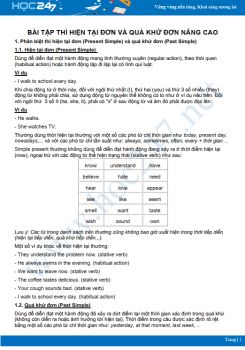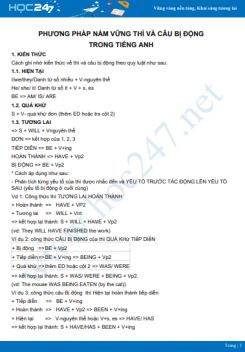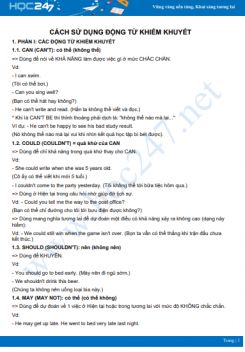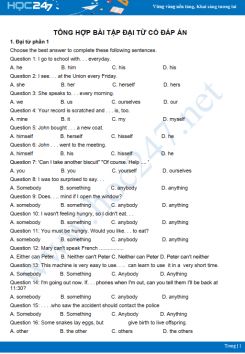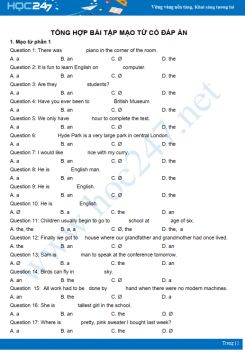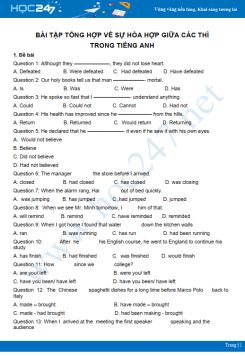Nhằm mục đích có thêm tài liệu cung cấp giúp các em học sinh lớp 10 có tài liệu ôn tập rèn luyện về nội dung kiến thức liên quan đến Tiền tố trong Tiếng Anh. HOC247 giới thiệu đến các em tài liệu Chuyên đề Prefix - Tiền tố với phần lý thuyết và bài tập kèm đáp án, lời giải chi tiết. Hi vọng tài liệu sẽ giúp ích cho các em.
Chúc các em có kết quả học tập tốt!
CHUYÊN ĐỀ PREFIX – TIỀN TỐ TRONG TIẾNG ANH
1. Kiến thức cơ bản
1.1. Tiền tố là gì?
Tiền tố (Prefix) là một loại phụ tố trong tiếng Anh gồm chữ cái hoặc một nhóm chữ cái kết hợp với nhau, thường được thêm vào đầu từ để làm thay đổi nghĩa gốc của từ.
Ví dụ: agree (v): đồng ý -> disagree (v): không đồng ý. Ở đây tiền tố “dis-” được thêm vào trước đã tạo ra từ mới mang ý nghĩa ngược lại với từ ban đầu.
Tiến sĩ Minninger, thuộc trường Đại học Minnesota, đã ước tính chỉ riêng 14 tiếp đầu ngữ phổ biến nhất cũng giúp ta hiểu được ý nghĩa của hàng ngàn từ! Các tiếp đầu ngữ dưới đây được tìm thấy ở 14.000 từ xuất hiện trong một cuốn từ điển khổ nhỏ thông thường và ở gần 100.000 từ xuất hiện trong cuốn từ điển phiên bản lớn không rút gọn.
1.2. Các tiền tố thường gặp
|
Tiền tố |
Hàm nghĩa |
Ví dụ |
|
ante- |
trước |
atedate (xảy ra, tồn tại trước), anteroom (phòng nhỏ, thường dẫn tới phòng to khác) |
|
anti- |
chống lại, ngược lại |
antibiotic (kháng sinh), antidote (thuốc giải độc) |
|
circum- |
vòng quanh |
circumnavigate (cho tàu thuyền đi vòng quanh) |
|
co- |
cùng với |
co-worker (cộng sự), co-author (đồng tác giả) |
|
de- |
hạ thấp, đi xuống, giảm, bỏ đi |
deforestation (chặt rừng), debug (gỡ lỗi), deactivate (vô hiệu hoá), decode (giải mã) |
|
dis- |
đối lập, không |
disagree (không đồng tình), dissatisfied (không hài lòng), disconnect (ngắt kết nối) |
|
em-, en- |
nhập vào |
encode (mã hoá), endanger (gặp nguy hiểm), empower (trao quyền) |
|
epi- |
gần…, sau…, vào… |
epiphenomenon (hiện tượng phụ xảy ra sau 1 hiện tượng), |
|
ex- |
trước, bên ngoài |
ex-girlfriend (bạn gái cũ), ex-prisoner (người đã từng là phạm nhân) |
|
extra- |
vượt, hơn |
extraodinary (khác thường, kỳ lạ), extraterritorial (ngoài luật pháp của một quố gia) |
|
fore- |
trước |
foresee (biết trước), foreleg (chân trước của động vật) |
|
homo- |
cùng giống |
homosexual (đồng tính), homogeneous (có tính đồng nhất) |
|
hyper- |
hơn, trội |
hypercritical (chỉ trích gay gắt), hyperactive (hiếu động) |
|
il-, im-, in-, ir- |
không |
illegal (trái pháp luật), impossible (không thể), indecisive (thiếu quyết đoán), irresistible (không thể cưỡng lại), incomplete (chưa hoàn thành) |
|
im-, in- |
vào, trong |
imprint (in dấu vân tay lên), in-flight (trong quá trình bay) |
|
infra- |
bên dưới |
inrastructure (cơ sở hạ tầng), infrasonic (có tần số dưới mức con người nghe được) |
|
inter-, intra- |
giữa, qua lại, trong vùng |
international (quốc tế, giữa các quốc gia), intra-family (trong nội bộ gia đình) |
|
macro- |
rộng, lớn |
macroscopic (đủ lớn để con người nhìn abừng mắt thường), macroeconomics (kinh tế vĩ mô) |
|
micro- |
nhỏ |
microorganism (vi sinh vật), microbiology (ngành vi sinh vật học) |
|
mid- |
ở giữa |
midnight (nửa đêm), mid-sentence (giữa câu) |
|
mis- |
sai, nhầm |
misunderstand (hiểu nhầm), mistreat (đối xử tệ bạc) |
|
mono- |
một, đơn lẻ |
monolingual (chỉ nói, dùng một ngôn ngữ) |
|
non- |
không, không có |
non-alcoholic (không chứa cồn), non-existent (không tồn tại) |
|
omni- |
tất cả |
omnipresent (có mặt, ảnh hưởng ở mọi nơi cùng lúc) |
|
para- |
ở bên, hơn cả, vượt lên… |
paranormal (siêu nhiên, không thể giải thích bằng khoa học), paramedic (trợ giúp về y tế) |
|
post- |
sau |
postgraduate (sau tốt nghiệp), post-modernism (chủ nghĩa hậu hiện đại) |
|
pre- |
trước |
pre-industrial (tiền công nghiệp), pre-flight (trước chuyến bay) |
|
re- |
lặp lại |
rewrite (viết lại), relay (chiếu lại) |
|
semi- |
bán phần, một nửa |
semifinal (bán kết), semi-conscious (thấy không được thoải mái lắm) |
|
sub- |
bên dưới |
subtropic (bán nhiệt đới), subcontinent (nửa lục địa) |
|
super- |
trên, siêu… |
supermodel (siêu mẫu), supercomputer (siêu máy tính) |
|
therm- |
nhiệt |
thermistor (điện trở) |
|
trans- |
qua, trên |
transatlantic (qua biển đại tây dương), transgenic (được biến đổi gene) |
|
tri- |
ba |
triangle (tam giác), tripod (giá đỡ ba chân) |
|
un- |
không |
unhappy (thất vọng, buồn chán), unrealistic (không thực tế), unfair (không công bằng) |
|
uni- |
có hoặc bao gồm chỉ một |
unilateral (gồm một nhóm hay một quốc gia), unisex (chỉ món đồ nhưng dùng được cho cả nam lẫn nữ) |
2. Ví dụ luyện tập cơ bản
Fill in the blank
Câu 1: People who can neither read nor write are termed ______(literate).
Câu 2: Tennis umpires often ______ (pronounced) Martina Navratilova's name during the Wimbledon championships.
Câu 3: Stealing and lying are ______ (honest) things to do.
Câu 4: The cyclist was ______ (qualified) from the race after failing a drugs test.
Câu 5: The electrical appliance should be ______ (connected) from the mains supply before the back is removed.
Câu 6: In Japan it's considered very ______ (polite) to blow your nose in public.
Câu 7: Smoking while pregnant is ______ (responsible) and puts the child at risk of illness.
Câu 8: The victim is expected to stay in hospital for another two weeks, and will be given ______ (biotics) to avoid risk of infection.
Câu 9: The inquiry found that they had been subjected to ______ (fair) treatment
Câu 10: Food which cannot be eaten is ______ (edible).
ĐÁP ÁN
1. illiterate
2. mispronounced
3. dishonest
4. disqualified
5. disconnected
6. impolite
7. irresponsible
8. antibiotics
9. unfair
10. inedible
3. Bài tập thực hành
3.1. Điền thêm các tiền tố để tạo từ mang nghĩa đối lập với các từ dưới đây. ( 4 từ cuối là động từ, còn lại là tính từ)
__happy
__patient
__polite
__legal
__correct
__regular
__visible
__possible
__legible
__friendly
__employed
___honest
__pack
__lock
___agree
___like
3.2. Hoàn thành câu mang nghĩa đồng ý với các ý kiến sau, sử dụng những từ đã học đồng nghĩa với các từ gạch chân để điền vào chỗ trống:
Example:
A: He doesn’t have a job, does he?
B: No, he's unemployed.
1. It’s against the law, isn’t it?
Oh yes, ..................
2. His room is always in a mess, isn’t it?
Yes,.................
3. He took off his clothes!
Yes, ...................
4. This handwriting is impossible to read.
Yes, I know ..............
5. She can never wait for five minutes, can she?
No, .................
6. I thought it was rude, didn’t you?
Yes, it was very ............
3.3. Hoàn thành động từ trong các câu sau:
1. I’m sorry, I mis.......... her message completely.
2. We un........... as soon as we got to the hotel, then went out for a walk.
3. She was here a minute ago, but then she dis................ I’m afraid I don’t know where she is now.
4. We normally have similar opinions but I dis............. with him totally on the subject of drugs.
5. My homework was so bad that I'll have to re............ it.
6. Apparently her alarm clock didn’t ring and she over ...........
7. She finally managed to un.................. the door and we were able to go inside.
8. I dis.............. the film, but the others enjoyed it.
9. I don’t think I’ll pass the exam, but I can always re.............. take it in Seprember.
10. The post office shuts for lunch but it should re............ at 2.00 p.m.
11. She’s over............. at the moment. She really needs a holiday and a complete break from her job.
12. My sister wrapped up my present so well that it took me about five minutes to un............ it.
3.4. Chọn từ thích hợp điền vào chỗ trống
1. James transferred from the parent__ company to one of its smaller__.
a. multinationals
b. conglomerates
c. subsidiaries
d. partnerships
2. The international conferene will have to be___ to a later date.
a. planned
b. arranged
c. rescheduled
d. prepared
3. Smart travelers research the prices of local hotels to ensure that they do not___when travelling abroad.
a. pay
b. repay
c. underpay
d. overpay
4. The public's ___ to the promotion campaign was very promising.
a. reaction
b. submission
c. suggestion
d. interjection
5. To resolve their differences, they employed an___ to deal with the two sides.
a. intermediary
b. investigation
c. assistance
d. advice
6. This kind of machine could become dangerous if it is___.
a. dismantled
b. restrung
c. circumscribed
d. mishandled
7. Some children become high-achievers to compensate for their parents'____.
a. interest
b. disinterest
c. disinterested
d. interested
8. Investigators suspect the engine broke because of a tiny____ in one of the parts.
a. perfect
b. imperfect
c. perfection
d. imperfection
9. We are a ___ organization dedicated to the conversation of ocean mammals.
a. profitable
b. non-profitable
c. non-profit
d. profit
10. They have agreed to__ in distributing products and providing support services.
a. operate
b. cooperate
c. coordinate
d. cooperation
11. They agreed that___ of the house into apartments would be a good idea.
a. division
b. subdivision
c. divide
d. subdivide
12. The government warned its neighbors not to interfere in its___ affairs.
a. internal
b. external
c. internality
d. externality
13. In the 1990s,most older teachers had never used the Internet – they had to___ themselves.
a. educate
b. education
c. re-educate
d. educating
14. We are doing our best in a highly competitive environment with an___ staff.
a. loaded
b. overload
c. load
d. overload
15. I was told she would be at the meeting, but clearly I was___.
a. misinformed
b. informed
c. inform
d. misinform
4. Đáp án
4.1. Điền thêm các tiền tố để tạo từ mang nghĩa đối lập với các từ dưới đây. ( 4 từ cuối là động từ, còn lại là tính từ)
unhappy
impatient
impolite
illegal
incorrect
irregular
invisible
impossible
illegible
unfriendly
unemployed
dishonest
unpack
unlock
disagree
dislike
4.2. Hoàn thành câu mang nghĩa đồng ý với các ý kiến sau, sử dụng những từ đã học đồng nghĩa với các từ gạch chân để điền vào chỗ trống:
1. It’s against the law, isn’t it?
Oh yes, it's illegal
2. His room is always in a mess, isn’t it?
Yes, it's very untidy
3. He took off his clothes!
Yes, he got undressed
4. This handwriting is impossible to read.
Yes, I know it's illegible
5. She can never wait for five minutes, can she?
No, she's very impatient
6. I thought it was rude, didn’t you?
Yes, it was very impolite
4.3. Hoàn thành động từ trong các câu sau:
1. I’m sorry, I mis understood her message completely.
2. We un packed as soon as we got to the hotel, then went out for a walk.
3. She was here a minute ago, but then she dis appeared. I’m afraid I don’t know where she is now.
4. We normally have similar opinions but I dis agree with him totally on the subject of drugs.
5. My homework was so bad that I'll have to re do it.
6. Apparently her alarm clock didn’t ring and she over slept.
7. She finally managed to un lock the door and we were able to go inside.
8. I dis liked the film, but the others enjoyed it.
9. I don’t think I’ll pass the exam, but I can always re do.take it in Seprember.
10. The post office shuts for lunch but it should re open at 2.00 p.m.
11. She’s over working at the moment. She really needs a holiday and a complete break from her job.
12. My sister wrapped up my present so well that it took me about five minutes to un wrap it.
4.4. Chọn từ thích hợp điền vào chỗ trống
|
1 |
c |
6 |
d |
11 |
b |
|
2 |
b |
7 |
b |
12 |
a |
|
3 |
d |
8 |
d |
13 |
c |
|
4 |
a |
9 |
c |
14 |
b |
|
5 |
b |
10 |
b |
15 |
a |
Trên đây là toàn bộ nội dung Chuyên đề Prefix - Tiền tố. Để xem thêm nhiều tài liệu tham khảo hữu ích khác các em chọn chức năng xem online hoặc đăng nhập vào trang hoc247.net để tải tài liệu về máy tính.
Hy vọng tài liệu này sẽ giúp các em học sinh ôn tập tốt và đạt thành tích cao trong học tập.
Mời các em tham khảo các tài liệu có liên quan:
- Bài tập Thì Hiện tại đơn và Quá khứ đơn nâng cao
- Phương pháp nắm vững thì và câu bị động trong Tiếng Anh
- Cách sử dụng động từ khiếm khuyết
Chúc các em học tập tốt!



